NETGEAR Orbi
When we first looked at the Orbi, there was just one version available, with two units in a box. One acted as your router, and the other was the satellite. This is the AC3000 version, with the product name RBK50, and claims to be able to cover 5,000 square feet (approximately 20m in each direction).
Since then, NETGEAR has released a cheaper AC2200 version (RBK40) with less powerful wireless radios and a ‘mere' 4,000 square feet of coverage. There's also a convenience-oriented spin on the latter where the satellite comes in the form of a single unit that plugs into your wall outlet, for places where you don't have space to put an access point and a power brick. This is the RBK30 version, and it has a 3,500 square foot coverage.
RBK50
The RBK50 system includes two nearly-identical units, plus two power adapters and a single Ethernet cable.
The RBK50 units are relatively large and their white finish is reasonably aesthetic. From the front there's little to distinguish them, apart from a removable clear plastic band that includes setup details. However, the router has a blue top and the satellite white, so you know easily which is which.
Both units sport four Gigabit Ethernet ports. The router has one coloured yellow, because this is the one that is meant to be connected to the ADSL or cable modem. This means it only has three ports free for wired networking devices.
The satellite has all four Gigabit Ethernet ports free, so not only does it extend the range of WiFi, but gives you an extension of the wired network as well, for devices that don't have WiFi built in. Both devices also sport a USB 2.0 port, which is a bit measly in these days of USB 3.1, and is disabled anyway, included only for future firmware updates.
Each RBK50 unit is tri-band, with two 5GHz 802.11ac radios, one at 1,733Mbits/sec and one at 866Mbits/sec, plus a 2.4GHz radio rated at 400Mbits/sec. The top 802.11ac uses 4×4 antennas and operates as a dedicated 1,733Mbits/sec “backhaul” from router to satellite.
Price: £349.99
Specification:
Wireless protocols: MU-MIMO with 802.11b/g/n 2.4GHz and 802.11a/n/ac 5GHz plus 256 QAM on both
Performance: AC3000 (1,733 + 866 + 400 Mbits/sec)
Antenna Configuration: 6×6 Internal Antennas
Ports: Router: 3 x Gigabit Ethernet, 1 x Gigabit Ethernet WAN, USB 2.0 (not used with current firmware); Satellite: 4 x Gigabit Ethernet, USB 2.0 (not used with current firmware)
Modem Support: VDSL/ADSL 2+ or cable
RBK40
The RBK40 system looks quite similar to the RBK50, except that the units taper more at the top. You get these two, their power supplies, and an Ethernet cable in the box.
Like the RBK50 units, the RBK40 router is distinguished from the satellite mainly by haivng a blue top where the satellite's is white.
Also like the RBK50, the RBK40 router has a yellow Gigabit Ethernet port dedicated for the broadband connection, plus three further Gigabit Ethernet ports. The satellite just has four Gigabit Ethernet ports. There's no USB 2.0 port on either.
The RBK40 unit is still tri-band, like the RBK50, with two 5GHz 802.11ac radios and one 2.4GHz one. But both 802.11ac signals run at 866Mbits/sec, so only 2×2 antennas are used for the decicated “backhaul”, with the 2.4GHz remaining at 400Mbits/sec. This is the reason for the AC2200 rating, where the RBK50 is AC3000. But the RBK40 is also £80 cheaper.
Price: £269.99
Specification:
Wireless protocols: MU-MIMO with 802.11b/g/n 2.4GHz and 802.11a/n/ac 5GHz plus 256 QAM on both
Performance: AC2200 (866 + 866 + 400 Mbits/sec)
Antenna Configuration: 4×4 Internal Antennas
Ports: Router: 3 x Gigabit Ethernet, 1 x Gigabit Ethernet WAN; Satellite: 4 x Gigabit Ethernet
Modem Support: VDSL/ADSL 2+ or cable
RBK30
The RBK30 system actually uses the same router as RBK40, but the satellite is completely different. It's aimed at plugging straight into your wall plug, for spaces where you don't have somewhere to place the freestanding satellite. So the box only contains one power supply and Ethernet cable alongside the devices themselves.
The router uses the same blue top to distinguish it, although in this case you're not going to get it mixed up with the satellite. The latter is much smaller and, obviously, has its power adapter built in so it plugs straight into the AC socket.
Since the router is the same as with the RBK40 kit, this has a yellow Gigabit Ethernet port dedicated to the broadband connection, plus three further Gigabit Ethernet ports, and no USB. The satellite doesn't have any wired Ethernet ports at all.
Where wireless configuration is concerned, the RBK30 is identical to the RBK40. It's tri-band, with two 5GHz 802.11ac radios, both running at 866Mbits/sec, and again only 2×2 antennas are used for the decicated “backhaul”, with the 2.4GHz remaining at 400Mbits/sec. So it's also rated at AC2200, but is £20 cheaper still than the RBK40.
Price: £249.99
Specification:
Wireless protocols: MU-MIMO with 802.11b/g/n 2.4GHz and 802.11a/n/ac 5GHz plus 256 QAM on both
Performance: AC2200 (866 + 866 + 400 Mbits/sec)
Antenna Configuration: 4×4 Internal Antennas
Ports: Router: 3 x Gigabit Ethernet, 1 x Gigabit Ethernet WAN; Satellite: none
Modem Support: VDSL/ADSL 2+ or cable
 KitGuru KitGuru.net – Tech News | Hardware News | Hardware Reviews | IOS | Mobile | Gaming | Graphics Cards
KitGuru KitGuru.net – Tech News | Hardware News | Hardware Reviews | IOS | Mobile | Gaming | Graphics Cards



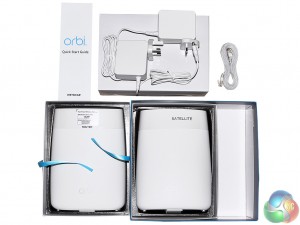
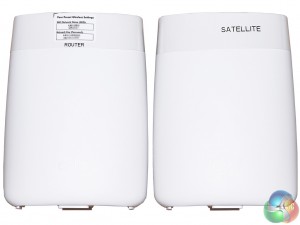
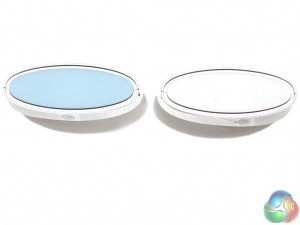
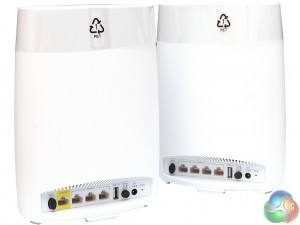
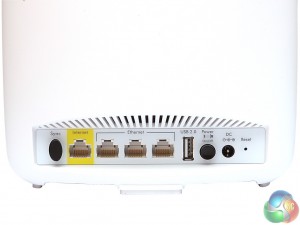
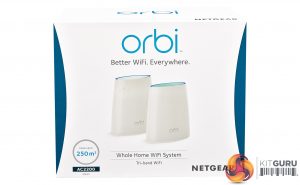
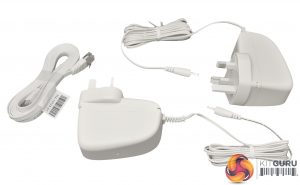
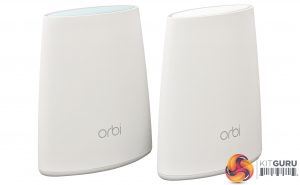
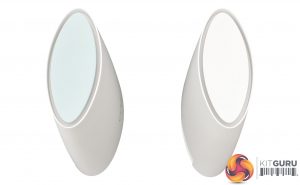
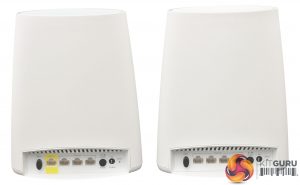
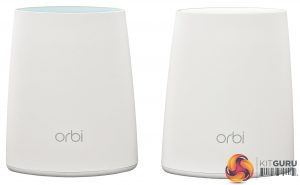
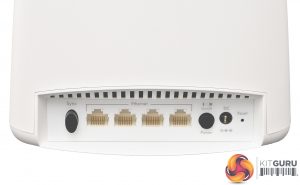
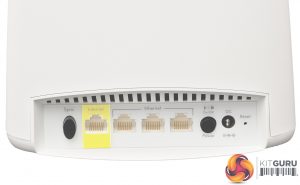
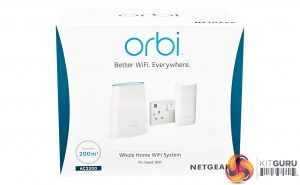
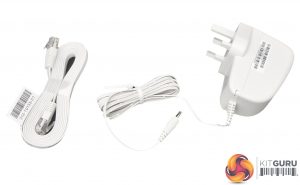
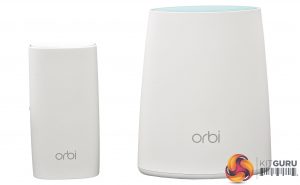
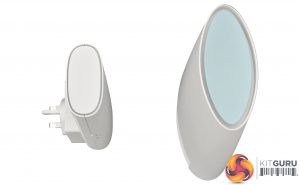
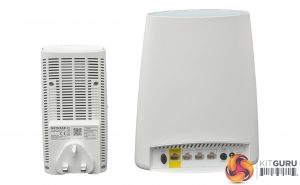

There are also the Ubiquit AmpliFi HD, eero (1st and 2nd generations), Amped ALLY, tp-link Deco M5, Asus Lyra, EnGenius EnMesh,… – we tested them all!
I have a netgear extender its the wkrst piece of carbage Netgear is one piece of junk and overpriced!
Would NOT touch the Orbi. Wired backhaul is NOT supported which is ridiculous. We purchased the Google WiFi 3 pack and love them. The app is slick and by far the best. You get wired backhaul.
No wonder Google WiFi is not only most popular mesh on Amazon but it’s actually most popular router of any type of router and well deserved.
No Eero?
Up195s
I guess I’m spoiled by City-Wide WiFi, buy Cable Internet and for 50+ miles (that’s as far as I’ve been, no reason it doesn’t work much further) you get walk-around WiFi where you’re always connected (unless you’re in between buildings, or in the countryside farmlands).
This seems expensive and designed for houses a tiny bit bigger than most large homes, and no advantage over 5 Gbps AC Networks.
For many km range, like video conferencing to the back 40, there’s Ubiquiti Networks airMax which goes as big as medium sized cities.
I can get 100′ off my old D-Link, much further away and I’m bumping into city-wide.
So much cheaper to put a high quality Router in the attic, and with 3-Band you can even get 7 Gbps (out, it’s not like your Phone or Laptop is likely to input at that speed).
I guess free WiFi has spoiled me and I’ve not studied this enough. Why is this better than cheaper AC Repeaters or an ‘octopus antenna’ Router – all the satellites add up to several hundred for a large separated family?